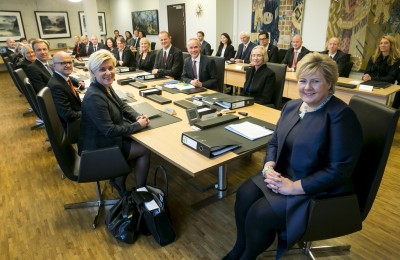As Norway’s new conservative government sat down to work this week, there was a lot of ministerial reorganization going on. More changes will occur from January 1st, when some ministries will be formally consolidated and the number of them reduced. The restructuring is part of the new government’s attempts to streamline operations and cut bureaucracy.

One of the most notable changes will be the formal dissolution of the current ministry for business and trade (Nærings- og handels- departementet) and the fisheries ministry (Fiskeri- and kyst- departementet), and their consolidation into a new ministry for both business and fisheries. It will be called Nærings- og fiskeridepartement, and will be led by two ministers: Monica Mæland, in charge of business and trade, and Elisabeth Aspaker, in charge of fisheries. Both are from the Conservative Party.
The division of the current fisheries ministry that dealt with coastal issues has been moved to the transport ministry (Samferdselsdepartementet), not least because those issues often dealt with ferries and other shipping operations. It will be headed by new Transport Minister Ketil Solvik Olsen of the Progress Party.
Growth potential
“Fishing and other use of the seas are businesses for the future with lots of potential for value creation,” new Prime Minister Erna Solberg stated in a press release detailing the ministerial restructuring. “To contribute to their growth, the government wants to see these businesses in connection with trade policies. Fishing has historically been an important industry for Norway. We want to make fishing and maritime businesses equally important for the future.”
The new ministry for business and fisheries will also take on responsibility for competition and corporate laws that until now were part of the Justice Ministry. The goal, according to Solberg, is to increase competitiveness in Norway and resist further division of the Norwegian economy.
‘Super ministry’ for government management
As previously reported, the ministry that until now has handled issues related to municipal governments (Kommunaldepartementet) will take on many of the functions of the ministry for renewal, administration and church affairs, which already has been shut down. It will be called the Kommunal- og moderniseringsdepartementet and be headed by Jan Tore Sanner of the Conservative Party.
Solberg noted that the large new department will thus take on collective responsibility for management of state and local government in one ministry. Planning related to the environment will also be assumed by the new “super ministry,” as it’s already been called, with the goal of giving local government more power and responsibility.
‘Modernizing, simplifying’
“We’re making these changes to further modernize the public sector, simplify management and view information technology policies, state and local administration in a larger context,” Solberg said. The church affairs of the old ministry, meanwhile, is being transferred to the ministry for culture, headed by Thorhild Widvey of the Conservatives.
The environmental protection ministry will change its name as of January 1st to the Klima- og miljøverndepartementet (Climate and environmental protection ministry). It will take over responsibility for climate and rainforest projects currently handled by the foreign ministry and for the purchase of climate quotas from the finance ministry. The goal is to strengthen efforts towards cutting emissions and improving programs to help stop climate change.
As previously reported, the Office of the Prime Minister will take on responsibility for coordinating all issues related to the EU and Norway’s economic agreement with the EU, the so-called EØS-avtale. “The goal is to take better care of Norway’s interests regarding the EU,” Solberg said, adding that the changes all contributed to a reduction in the number of government ministers and ministries.
newsinenglish.no/Nina Berglund

